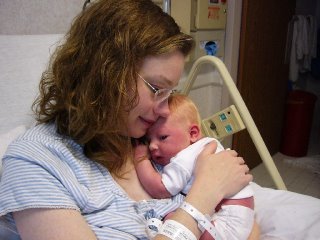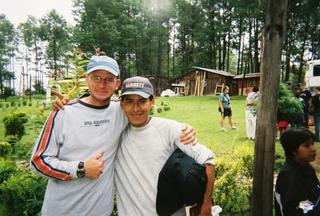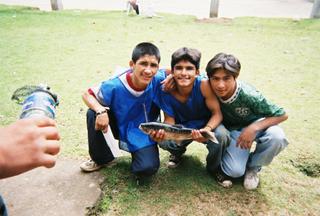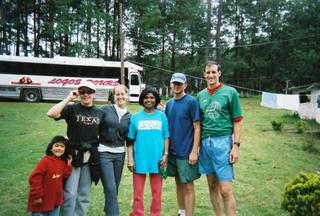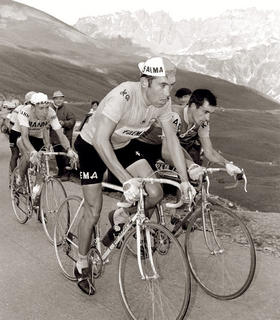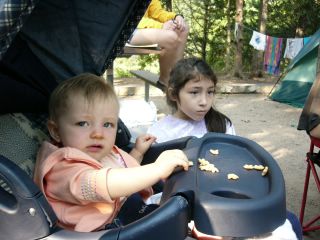I was honored to write an article for this month's Chatter (church newsletter - www.chattermag.com) about Rex Greenstreet. Rex was an incredible person who I looked up to. Even though I didn't know him well, what time I did get to spend with him was very encouraging. I suspect that if I spent every day with Rex, every day would be encouraging.
Rex Greenstreet, a Legacy of Service
On October 1, 1987, Rex Greenstreet was baptized in a backyard swimming pool in Irving. He was carried to the water by friends and held afloat by IBC Pastor Andy McQuitty and, as his roommate John Roberts remembers it, he was terrified. It might have been the first time Rex had been completely submerged since a swimming accident 26 years earlier had left him paralyzed from the chest down.
Rex recalled the accident in a 2001 interview. “I dove for the water headfirst and hit bottom. I was immediately paralyzed from the neck down, but I never went unconscious. I thought I was going to drown lying there face down in the water. I couldn’t move.”
But despite his memories of water, despite being a quadriplegic, despite having every excuse not to venture into that pool, Rex did. Turns out, that wouldn’t be the last time Rex overcame fear with obedience.
Rex’s life mirrored his baptism in many ways. He had every reason to avoid obedience, to be bitter at the hand life—or God—had dealt him, to sit back and let others leave their comfort zones while he stayed in his familiar, if not ever entirely comfortable, chair. Instead, his ministry was so faithful and so courageous he became the first person ever to have an IBC ministry named in his honor. Rex died on September 25, 2005. He was 67.
Rex Wharton Greenstreet was born in Fort Worth and raised in Midland. He loved sports and the outdoors. In his youth, he was a cheerleader at Midland High School and a middle weight boxer, winner of Gold Gloves awards. He went to the University of Texas, played a lot of handball, married, took a job with Liberty Mutual Insurance and had a son. The photographs on display at his memorial service showed him young and strong, standing tall with broad shoulders and a broader smile.
Then there was the accident at Lake Lavon that severed his spinal cord. Rex was 23 when it happened; his son was nine months old. He spent three weeks at Baylor Hospital in Dallas and 10 months at Massachusetts Memorial Hospital in Boston. He was separated from friends and family. His wife left. The doctors said he would never walk and probably never regain use of his hands. Physically, emotionally, relationally, his was a paralyzed life.
Remarkably, Rex regained enough control of his body to return to work. He moved back to Dallas and to his job at Liberty Mutual where he became a claims adjuster. But Rex was convinced there was something more to do—something his life was missing besides strong legs. He started to watch Billy Graham on TV and listen to Charles Stanley on the radio.
“It seemed like every time I turned on the TV, those guys were on. And every time they were on, they were giving the gospel.” Rex said. But the gospel they were preaching was about humility and surrender—a message that didn’t sit well with Rex. “My dad was a survivor, and I was brought up to be that way. Pull yourself up by your bootstraps. Frankly, I had always thought that anyone in any religion was just escaping from the world. Just wimps.” Even from his wheelchair, Rex held to his strength. The prospect of yielding to anything—misfortune and God included—scared him.
But there was a night when Rex awoke in tears and gave his heart to Jesus. “That night, it just all came together,” he remembered. “I said, ‘God, I don’t know about all this, but I want you in my life.’”
Not long after that experience, Rex’s nephew invited him to IBC. Again, he faced a frightful prospect.
“You can’t really sneak into church in a wheelchair,” Rex remembered. “I didn’t know what to expect. I didn’t know if they were going to run me up to the front and try to heal me or what. I was scared.”
But the pattern of obedience over fear was being established in his life. Rex came to IBC and stayed. That first visit was in 1986. He was baptized in 1987. And soon after, he was invited to take on a ministry that would make him the voice of Irving Bible Church to thousands of visitors. Again, it was an invitation that terrified him. He was asked to take visitor cards from the service each week and call visitors at home.
“I was a claims adjuster for 26 years. Most of that time I was on the phone and it was always confrontational,” Rex said. “I didn’t want any part of phones. The last thing I wanted to do to serve the church was to call people.”
By now, though, Rex knew what to do with fear.
“People really appreciated me calling,” he said. “I just got to where I loved it.”
And he was good at it. Years of phone calls with insurance claimants had taught him to listen well and take copious notes. Soon, the church staff discovered the value of what they called “Rex Notes” for discerning visitors’ interests and ministry needs.
From 1988 to 2003, Rex called every IBC visitor—sometimes more than 50 calls per week. In the last five years of his ministry alone, Rex placed more than 20,000 calls, and prayed for as many people. “I always pray before I dial,” he said. Often, the calls were all protocol and information. But many times, Rex said, they were personal and poignant.
“Sometimes people are hurting and they just want to talk,” Rex said. “Most of the time, people just need someone to listen.”
Hundreds of people who are now serving in IBC ministries made their second visit to the church because of Rex’s call.
“I’ve had people come to me and say, ‘You know, Rex, the only reason I’m here at IBC is because of your phone call,’” he said. “That makes you feel like you’re helping.”
But the greater blessing may have been for those who knew Rex beyond the phone calls. IBC Community Life Pastor Nat Pugh can trace his ministry at IBC to the welcome phone call he received from Rex after his first visit. And Nat can trace the route Rex took through the IBC halls every Sunday, stopping for a cup of coffee that he placed on the make-shift rubber pad he had glued to the cover of his Bible so it wouldn’t spill. “He always stopped at the kiosk and got three butterscotches,” Nat smiled. “I’ll miss seeing him.”
His roommate, John, remembers Tuesday and Wednesday mornings as the highlights of his week. Those were the mornings after Rex made his phone calls on Mondays and Tuesdays.
“I couldn’t wait to get out of bed and go to the living room,” John said. “Rex would be there drinking coffee, and I would get to hear the stories about the phone calls. Imagine living with someone like that. You grow every minute you’re with him. Rex used to drive around the neighborhood and give out money or food. He used to mail his testimony to people blindly. One of his favorite verses was ‘faith without works is dead’. Rex was alive.”
When his failing health finally forced Rex to stop making phone calls, the church placed an announcement in the worship bulletin telling of the need for volunteers to take over the job. The project was named the Greenstreet Ministry. And it took eight people to do the work.
At his memorial service at IBC on October 5, the photos from Rex’s later years seem to look more and more like those from his youth. The broad smile is there. There is strength in his expression if not in his legs.
“I’ll miss that sparkle in your eyes that revealed the depth of your love for Christ. You gave so much to us and never complained about your situation,” eulogized Barbara Greenstreet, Rex’s sister-in-law.
But the most concise praise at Rex’s memorial service may have also been the most complete, from the man who baptized him in that swimming pool in 1987, a witness to Rex’s fierce obedience in the face of fear.
“I couldn’t imagine myself being in the position he was and having the level of joy he had,” Andy said. “Rex, you lived more powerfully and influentially, from your chair than most people do in perfect health.”
On September 25, Rex answered the call to come home. Now he stands—yes, stands—in the presence of God, his smile broad, his fear gone, his reward complete and, probably, with three butterscotches in his pocket.



